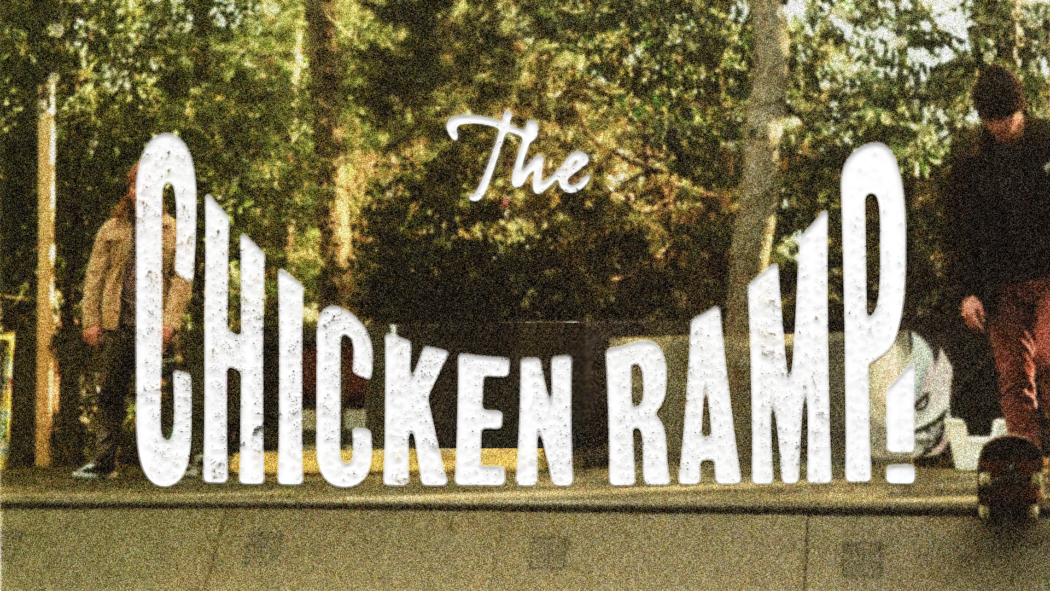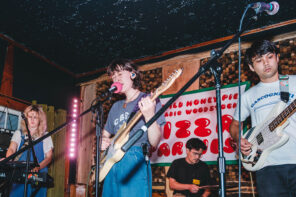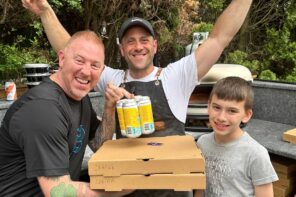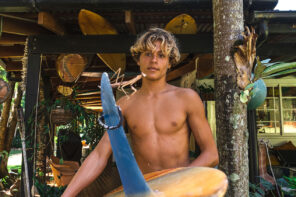By Olivia Bishop
Last summer, I stumbled upon a magic mini ramp in the heart of the Savannah, GA suburbs. Some call it a backyard project. Some call it an autonomous skate zone. But the truth is that skateboarders of the Southeast call it by a name no other than “The Chicken Ramp.” For me and many others new to the sport, The Chicken Ramp hatched a newfound love for skateboarding and the community that surrounds it. In this article, I interview the two main dudes who are behind one of the most convivial skate spots known to humanity: Brian Ralph and Zack Cox.
I stepped into the middle of the ramp, awkwardly clutching the thick, wompy board that Zack had kindly lent to me. I inspected it briefly. It was wider than my two big feet. Stickers had amassed like the bugs on the windshield of a car. It was as if he had skated so fast and so frequently that these stickers got caught in his wake and had no choice but to ride it out until it slowed down. Only, joke’s on them. He never stops skating.
I met Zack last summer in the studio I was working in. He was tall, tattooed, and talked like a heat wave – lengthily and lazily. He was sweating through his old t-shirt and pair of Dickies as his hands, calloused and covered in dust, gripped a whirring power drill. My friend Jeanette needed help constructing walls for an upcoming art show, so Zack was there to help. He was content enough to talk with us as he worked, but he came alive when someone mentioned skateboarding. Maybe it was actually Zack who brought it up. Regardless, his eyes lit up as he told us about the new mini ramp he and his friend Brian had built in his backyard, right next to a coop full of chickens.
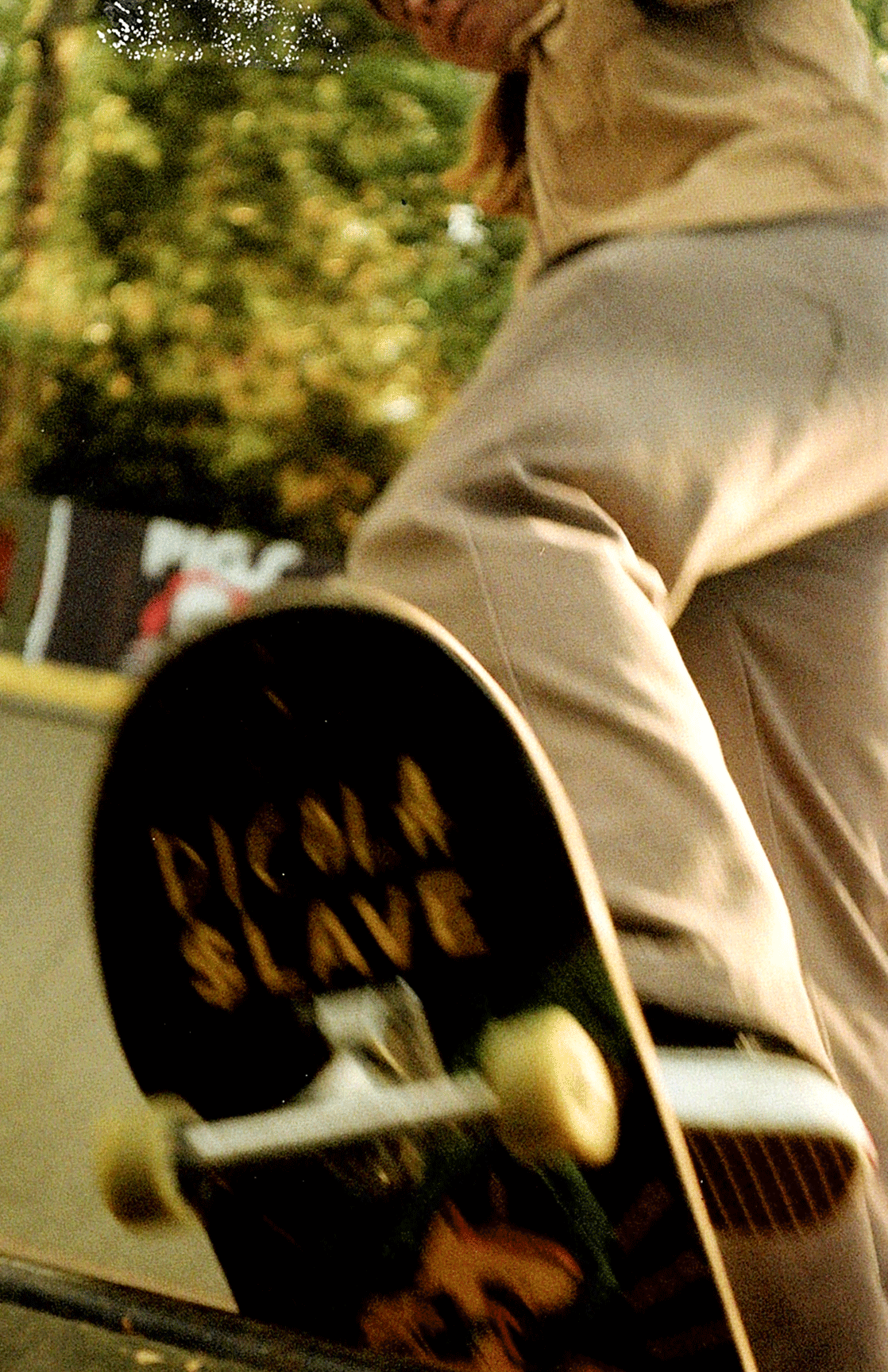
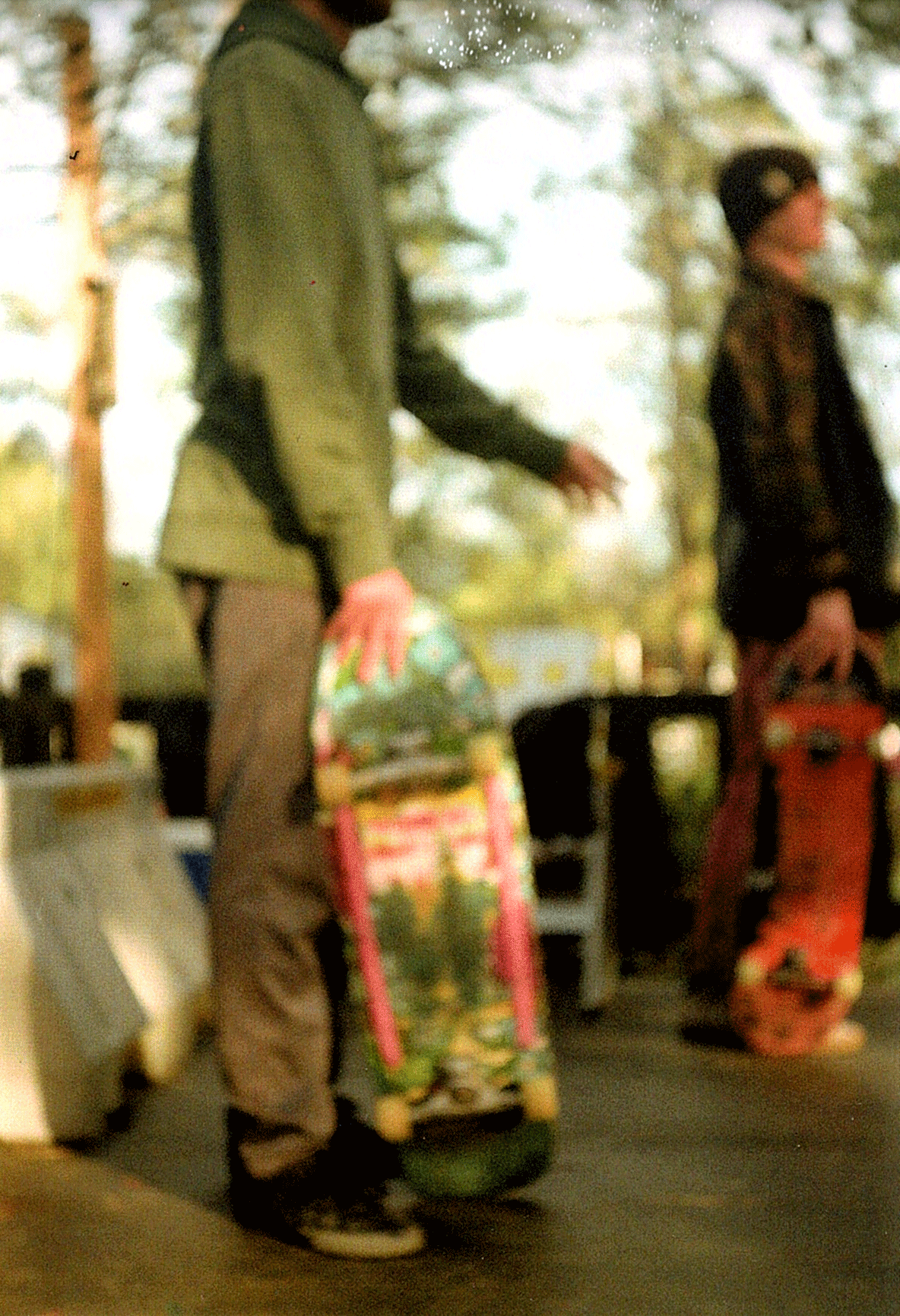
The Chicken Ramp started as a tempting idea conjured up over PBRs at the Savannah skatepark. It was bred from the boredom of skating the same park day in and day out, not having access to another park for an hour in any direction. They floated the idea around, trying to gauge whether it was a good idea or not. It wasn’t until they went ahead and put the first frame down that the project gained any momentum.
Then, something incredible happened: a small group of skaters, normally the sort to do their own thing and keep to themselves, started showing up on their own accord with scrap wood, power tools, and if they didn’t have either of those: two eager hands. Over the course of a few weeks, they had built the first phase of The Chicken Ramp. Zack invited us to come check it out for ourselves that coming weekend. So, we did.
It was the ramp I was nervously standing on, knees shaking like a newborn giraffe. According to Zack and Brian, it’s Savannah’s “Premiere Chicken Themed Skate Arena”. To me, it’s a convivial spot where friends and newcomers alike can connect through skateboarding, shoot the shit, and find their community. It’s the place where I learned, again and again, how supportive and innovative the skateboarding community is.
When I first approached the structure, it was hard to believe that it was a DIY project. It was part mini ramp, part treehouse and covered in grip tape, spray paint and skaters. Stairs led up to the first platform where a few dudes were waiting for their turn to drop in. Attached to the back of the ramp was a shaded tree house deck, dotted with three rusted chairs, a few beer coolers, and a radio murmuring classic rock. A big magnolia tree hung over the structure, blocking out most of the sweltering sun. Looking down at the ramp, I admired the precision of the ramp’s build. It was expertly laid out and that was seer-suckered under the metal coping. The seams were so precise it could give a papercut. We took a seat in the shade and watched the dudes do their thing.
The skaters masterfully glided back and forth, displaying different tricks on each pass. At the vertex, they were a suspended ball of weightless energy, their board loyally bobbing beneath their feet, their tanned arms rising like bird wings. Then, once gravity caught up with them, they would crash down on the plywood with a satisfying crack, sticking the landing. Their friends knocked their boards on the platform with a pock, pock, pock in show of praise. Watching them skate so freely and effortlessly made me want to join them and find that feeling, whatever it was, that lit up their faces like that.
The Chicken Ramp cracked opened a whole new world for me. One that feels like standing at the edge of something tall and grand, teetering between uncertainty and the joy of feeling like you belong somewhere. It’s a community that I want to describe to you because I want you to know that you can find a community (or make one) wherever you go. All you need is a little confidence, a little resourcefulness, and the willingness to try something new. You might just find all of these things at The Chicken Ramp.
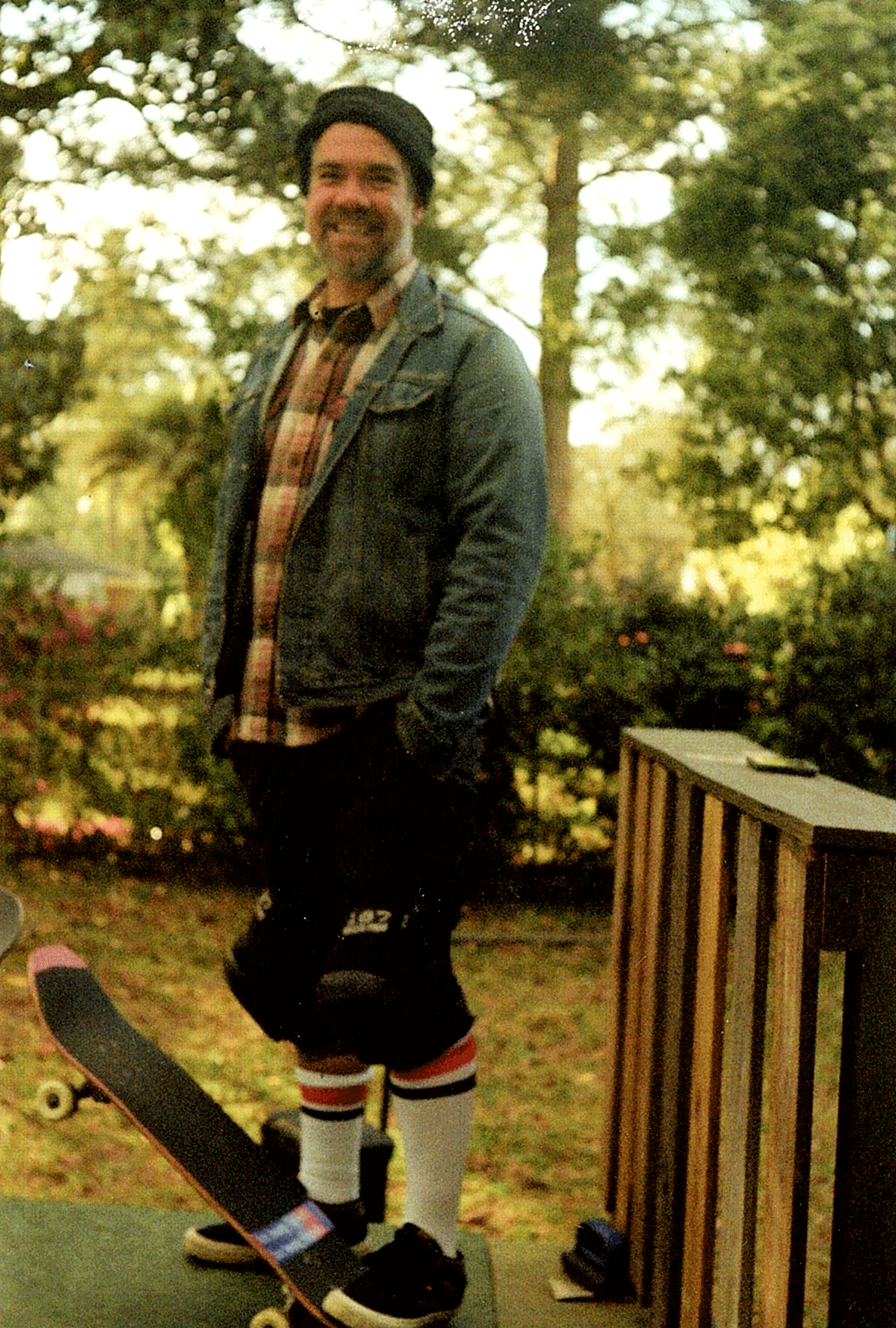
Olivia Bishop: Maybe introduce yourself first. What do you do? And then we’ll get into The Chicken Ramp.
Zack Cox: I’m an art handler. Meaning all the behind the scenes sort of things when you see artwork displayed in any fashion, any place. That’s my line of work. And it’s actually a really great job for skateboarders.
Brian Ralph: I’m a professor who teaches comics. I’m also a cartoonist and illustrator.
OB: So first of all, what is the chicken ramp? How would you define it? And how did it come to exist?
BR: We joke that it’s the Premiere Chicken Themed Skate Arena. It’s just like a backyard mini ramp, but it turned out to be huge. I think we got so enthusiastic about building we just kept saying it’s gotta be bigger.
ZC: It definitely snowballed for sure. It basically came out of necessity of just not having a lot of things to skate in Savannah. Having a ramp like that, I mean, you gotta drive about 45 minutes to an hour to skate something like that here. So Brian and I casually talked about it at the skatepark night it got to a point where I think we both just said, Well, why don’t we just do this? So we did it. Instead of just talking about doing some cool shit, you know, we just did it. I had a blast all the work days we had out there.
OB: Yeah, I think that sounds like you guys all got into a collective flow state when you were making the ramp.
BR: Yeah. That’s a good way to describe it. We were all sort of an organism building it. You know, It was funny. What was perfect was when people just started doing stuff. There was no Foreman telling you, Hey, do this, Hey, you do this. People just started doing stuff and seeing needs. In a lot of ways it’s like the flow state you’re talking about.
OB: It helps that you guys have that creative spark. Zack, you know how to actually build stuff, and I’m sure there’s YouTubing involved, but just the willingness to do that is so cool. You put some power behind it. You guys had people donate a lot of materials, and then come help build it, right?
ZC: Yeah. I was working at a sheet metal factory at the time and all of our material came to the warehouse on big pallets. When I had downtime at work, I would just rip these pallets apart and a lot of the two by fours at the ramp are just from that. It kind of felt like a fun game to see how much of this shit we could build without actually paying for it. I’d say more than 50% of it was reused material. I also want to say that Brian had found a burned down house in his neighborhood and grabbed smoke damage two by fours and I think are in the ramp now.
OB: That is metal, Brian.
BR: Well, wood was super expensive. Everybody was looking at dumpsters and people were sending me pictures of pallets and things. I drove by a dumpster and I saw them throwing out tons of wood. I was like, Oh my gosh, can I, you know, take some? It just took a little bit of like putting myself out there and asking, hey can I have this?
OB: Were you surprised at all that people came out and helped so much?
ZC: I wasn’t. Just because, I mean, it’s in the nature of skateboarders. I think it was really easy for people like Brad and Wes and, whoever else helped us a lot in the beginning, to hop on board knowing that they would have this thing and be able to skate it and have fun, and, you know, everything that comes with that.
I wanted a space where people could just come over and feel really at home and relaxed.
BR: Yeah, the thing about skateboarding was we had to be so resourceful and you had to build all your own stuff because there wasn’t anything to skate. So, we were used to looking at spaces in new ways and, you know, trying to figure out how we could use it. So of course, when you took this whole community of skateboarders in Savannah, everybody pooled their resources. Materials were just coming in, you know. Someone would be like “Oh, yeah, my dad’s got this extra wood” and “This guy Jason’s got a bunch of wood in the truck.” So yeah, that was great.
I was amazed, too, because you know, it’s in my backyard. But everybody was treating it like their own. I really want people to have some ownership over this thing. I wanted everybody to feel like they had a hand in making it. I wanted a space where people could just come over and feel really at home and relaxed.
OB: Tell me about the neighbors. What was their opinion?
BR: That’s one of the craziest parts about it! My neighbor next door, Carol, saw it and I was like, “Oh, Carol, we’re building a thing back here.” I think I even said, like, “Oh, you know, for the kids to fool around on”. I thought if I mentioned my kids, she would feel like, “Oh, it’s a fun backyard thing.” So she wouldn’t derail it. She’s been, really, all the neighbors have been so supportive. Every once in a while somebody will come to the fence or walk up to me and I’m like, “Oh, is it too loud? Is it too loud?” They’re like, “No, I want to see it. What are you doing back there?” It’s awesome. Because on big days, the whole street’s filled with cars and people all over the place. But so far, so good.
OB: You get that feeling of community when you go back there for a big skate day or a barbecue party. There are skaters, skaters’ friends and significant others. There’s kids. There’s chickens, both in the coop and on the grill. It’s just awesome. I want to hear about how those kinds of events started. I’m sure it was also very organic and you just wanted people to come hang out, but you also have done some skateboarding competitions and giveaways and stuff, which is really fun. Can you tell me more about the events and why you have them?
BR: I almost felt like once we made it past the initial barrier of the neighbors knowing about it, I felt like, “What? Nobody’s complained? All right, well, now let’s see. Let’s see if we can do this. Let’s have a big Fourth of July party.” But I think we chose Fourth of July because it was like, who’s gonna complain about you throwing a party on Fourth of July? So then we thought, let’s see if we can have a big contest, or let’s see if we can get companies to donate decks that we can give away or raffle off. That was great. That was such a good feeling.
ZC: I mean, I’m sure there’s been a party where there have been people from at least three different states; Florida, South Carolina, and Georgia. I think that’s kind of cool that I’ve heard people bring The Chicken Ramp up that I’ve never even seen in my life before.
BR: For those parties, we have Fourth of July, then we did a Halloween thing. I was kind of worried about people coming to my house and using the bathroom. I was like, there’s gonna be a bunch of people sort of hanging out in my house and drinking. But everybody was outside and kept it really, you know, just a normal neighborhood party.
OB: I think there’s still a stigma around the skateboarding community leftover from the days where people thought that only dropouts and stoners were a part of it. That’s a story and a narrative that you hear a lot. Even today.
ZC: Well, it’s not not true, either.
OB: Well yeah. Stereotypes start from somewhere, right? I had this pre-skating notion of what skateboarding was and who skateboarders were. Now I have a completely different understanding of that and it’s much more positive and open. I realized so much more about it. I think it’s really special that The Chicken Ramp also brings light to just how kind and open the skateboarding community can be, and how creative and how collaborative and supportive people can be in that community.
ZC: I think there’s always going to be a couple of people that are kind of like, just awful, but for the most part, everybody I’ve met through skateboarding has just been super enthusiastic. Like at any skill level, they’re just so enthusiastic and so helpful. They want you to land what you’re trying to land even if they already know how to do that trick.
ZC: Just like you, Liv, dropping in. Liv dropped in at the skatepark. Did you see that?
BR: Yeah. Absolutely. You would not believe this, but I’ve definitely fallen just dropping in on that, like, you know, you got careless or whatever. I’ve seen. I’ve seen really good skaters just blank and just fall. Like, I think I saw Brad drop in and just slammed out of nowhere.
OB: Yeah, but it felt really good to have this goal and that Zack helped plant the seed that “You’re going to do this before you leave.” Because I was thinking about it and I think it’s such a huge thing about skateboarding, too. It’s just you against your brain and overcoming fear, time and time again. It’s not that it’s not there. It’s that you have a positive self talk and people around you to help you get past that fear. Zack was that person that day when I dropped in, which was awesome.
I want to learn a little bit about you guys and your skateboarding experience, because I think people come into skateboarding at different points in their lives. Sometimes it’s before you can even remember. Maybe you literally came out of the womb skateboarding or maybe you started on a board like me when you’re 23. Maybe even later than that. I think people are introduced to it in different ways. So how did you start? And what’s your relationship to skateboarding been?
ZC: I vividly remember my buddy having one and he didn’t really care about it. I stood on it and I was like, hooked immediately. He lived on a street that was on a hill. So we used to just try to see how far we could stand on it and ride down it. I convinced him to let me just borrow his board for a while. Then I just kept it, I guess, I don’t even remember how I got my first board. I think it was like a hand me down from my mom’s friend or something. I literally have never stopped since probably the year 2000.
BR: I think I got amped on going to the skate park and meeting people. When I went by myself, I wouldn’t feel like I’d be as excited. When I started meeting people and making friends, that kept me going back. I think the times that I sort of dipped out of skateboarding was when I lacked friends that skated. I had a huge, great crew of people in high school. Then when I made it to college, I still skated. But you know, it didn’t really link up with a lot of people. By the time I was out of college, all of a sudden I didn’t necessarily have that same connection with those friends anymore. So, I sort of quit for a while. I always had a board. But, you know, I would always just go to a skatepark for myself. It’s only when I came to Savannah and started meeting people when I really started getting way back into it. It was just because of the community aspect of it.
OB: I think, people who are just starting out with skating, like myself included, there’s not a clear entry point, right? I skateboarded for like a very brief time when I was in fourth grade. Then I fell and banged my knees super bad. I didn’t have any other, you know, girls who were going to skateboard with me, so I just dropped it. It wasn’t until I was invited to The Chicken Ramp that I felt like, “Oh, I can do this. Oh, here’s a community of people.” That’s when I finally had the confidence to get back on the board and start building my own skateboarding practice, if you will.
Do you have any advice for beginner skaters, and how they can find an entry point into the sport, and also this community?
ZC: I would say if anyone is interested in it, it’s as simple as just going to a place where a lot of people are skateboarding. Being willing to be vulnerable is huge. Because I mean, it’s probably really intimidating at first, I’m sure, to show up to a place.
OB: Oh, yes.
BR: I would say you just got to show up and start doing it.
ZC: I think that’s really the most important part is just not getting discouraged and feeling like you shouldn’t be there. I mean, it’s like anything: everybody starts somewhere. That’s the whole point. It’s building blocks. It’s learning something one day that’s going to open up something a month down the line, and it just keeps snowballing that way.
Being willing to be vulnerable is huge.
BR: Also don’t feel like anybody cares that you suck. Nobody cares that you suck. So I would encourage kids, like, don’t just sit around at the skatepark. Just go start skating and everybody will get psyched that you’re in the mix with them. Remember that every time you feel like you’re getting a little psyched out, or discouraged, or I’m not good enough to skip these guys, or whatever. It’s such a small handful of people that are going to be sort of jerks about it. Everybody else is really, really excited for you.
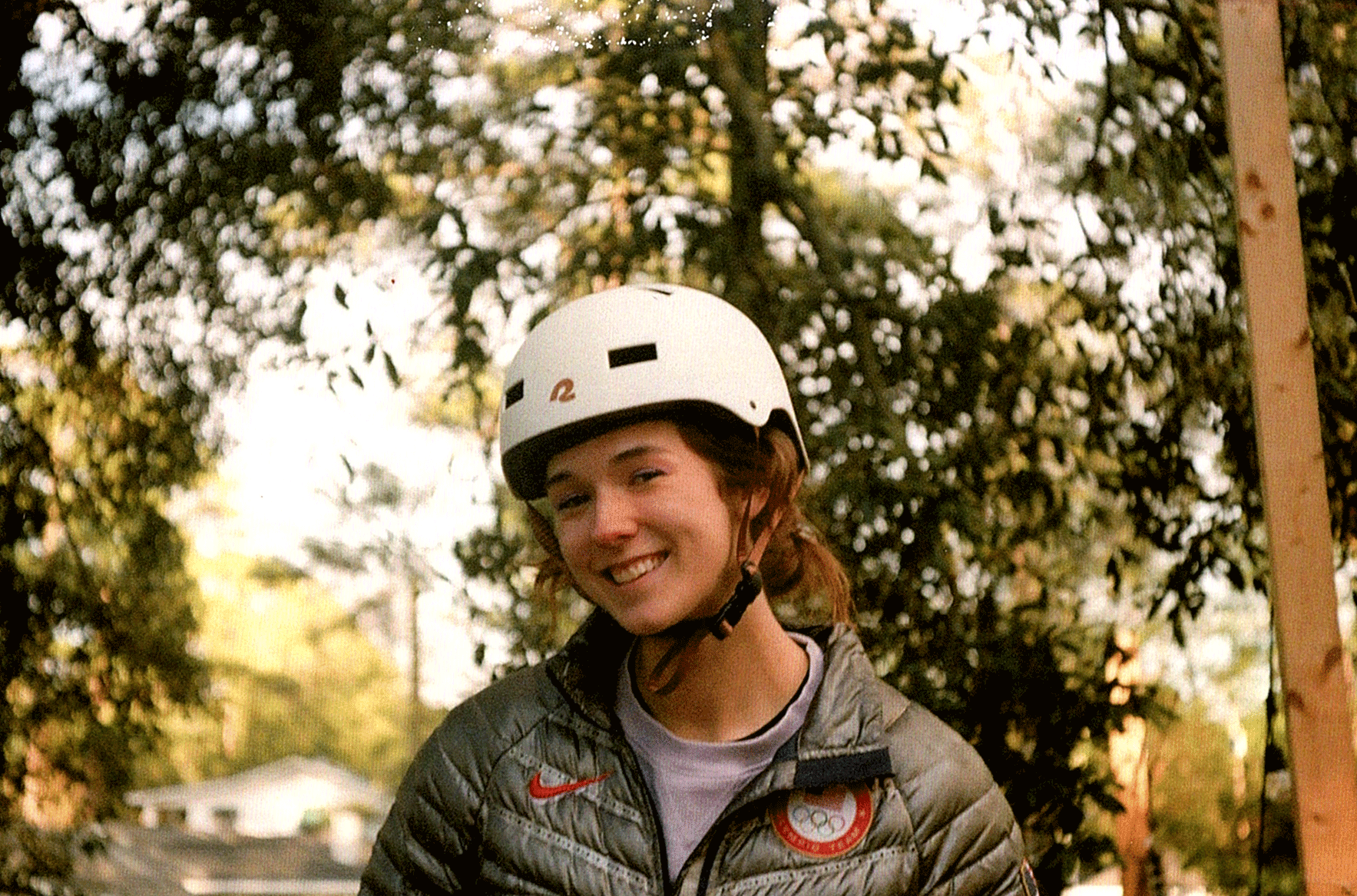
OB: Yes, yes, exactly. That is awesome advice for beginners. I remember coming to The Chicken Ramp, and then the first time that I even pushed on the board in the middle of it, I looked up and there’s just a line of sweaty, shirtless dudes staring down at me. But with obviously the most supportive enthusiasm.
BR: Oh no!
OB: No, it was great. I absolutely loved it. I also grew up with brothers and I’m, like, a tomboy. And so I don’t mind if I’m intimidated, I’ll just kind of be like, “That’s silly. You can just be yourself, it’s fine.”
What is coming next for The Chicken Ramp? What would you like for The Chicken Ramp going forward?
ZC: Oh, really Brian’s call. It’s his backyard. I will keep building until someone tells us not to anymore.
OB: Can this article help you in any way? Can I put a call for anybody who’s reading who wants to support it?
BR: Yeah! We would love to do giveaways of products. We’ve tried so many different people to say, hey, like, we’re doing these things. Can you give us some stuff to give away to the skaters? A couple of companies that came up really big with products and donations. If we could do more with that, that would be awesome. One of my favorite things is giving stuff away to people.
ZC: Yeah because we’re adults, we can buy whatever we need for skating, but there was a time when that wasn’t the case.
OB: No, seriously, because that will change somebody’s life. You guys both said you got started on a hand me down board. The critical piece for new skaters to continue skating is having access to that equipment. So, I think that would be super cool if brands read this and get involved or different like skateboard companies to get involved. Really, whoever resonates with it. Maybe they’d want to send some money your way or materials or something.
BR: Yeah, it’s just such a thrill anytime somebody sends products, because to give it to somebody, it will really mean a lot to them. Like, “Oh, man, I got a free deck!” That could encourage that person to feel really good about their skateboarding.
OB: And you guys deserve to make this as much as you want it to be. It’s already flourishing into a beautiful community. It’s awesome what you guys have made. I know you’re used to it because you’ve been around it so much. You know, it’s in your backyard. You go enjoy it all the time. This is really cheesy, but it’s literally changed my life, guys. I have a whole new passion and people that I love being around. So, Thank you.
To learn more about the Chicken Ramp and how to keep it clucking, visit chickenramp.com or follow @chickenramp on Instagram.

